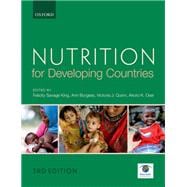Nutrition is an essential component of the work of all health and community workers, including those involved in humanitarian assistance, and yet it is often neglected in their basic training. Drawn from the experiences of an international editor team with extensive field experience, Nutrition for Developing Countries brings together the essential basics of nutrition in an easily accessible form which is accurate, up-to-date and practical, and suitable for a wide range of readers at different levels. The book covers the whole life cycle, including pregnancy, breastfeeding, complementary feeding, older children, adolescents, adults and the elderly, with an emphasis on the most vulnerable women and children.
The fully revised and updated edition addresses both the long standing problems of undernutrition and malnutrition, and the growing epidemic of overnutrition and obesity, which are responsible for the rapid increase in non-communicable diseases of later life. Generously illustrated, Nutrition for Developing Countries explains in clear simple language, and practical detail, how nutrition workers can help families with nutrition problems, including many ideas for exercises for training nutrition workers.








